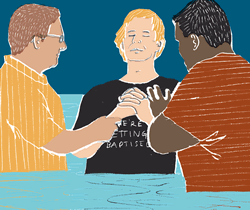Baptism, a mark of beginning
Continuing in his teaching, Peter explained to the crowd, that they should be baptised in the name of the Lord Jesus (Acts 2v38).
Baptism is a mark that we have begun the Christian life, that we are now part of the family of God. If you study the teaching in Peter's sermon you will see that Baptism follows faith; believe and be baptised. It is the same elsewhere in the New Testament. The great commission of Jesus is to "go and make disciples of all nations, baptising them in the name of the Father, and the Son and the Holy Spirit" (Matthew 28 v19). The order is the same; baptism follows belief.
Download the text of Lauren's story (PDF 26kb)
There are various reasons why we should be baptised as believers in Jesus Christ. Firstly, of course, Jesus himself was baptised and we are following his example. Then, as we have seen above, Jesus taught that his followers should be baptised, as a freewill act of allegiance and submission. Believers' baptism is taught by the apostles (see not only
Acts 2 as above, but also Acts 10 v48, Acts 16 v15 for example). The first believers were baptised. It was a natural mark of being a Christian. So in Acts 2 v14, 3000 new Christians are baptised after Peter's preaching at Pentecost. Philip baptised believers in Samaria (Acts 8v38). Paul was baptised after his dramatic conversion (Acts 9 v18)
A study of the New Testament shows that there were five dimensions to the beginning of the Christian life. Repentance for past sins; faith in Christ; receiving the Holy Spirit; believers baptism; joining the church, which is the community of believers.
All five dimensions are vitally important for a good Christian birth, and for a good foundation for ongoing Christian living
So what does baptism mean?
The New Testament explores the meaning of baptism, using various images and metaphors.
Firstly Baptism is a sign of our union with Christ. Baptism points to the death and resurrection of Jesus, an image that is explored by Paul in Romans 6. Going under the water, symbolises dying with Christ, and coming up out of the water (!) symbolises union with Jesus in living resurrection life. There is a rich symbolic connection between Jesus' death and resurrection and our own conversion and experience of baptism. We have died to an old way of life and rise to new life in Christ.
Then again baptism symbolises being made clean from sin. Baptism does not make us clean, only Jesus finished work on the cross, only Jesus death, can do that (see 1 John 1 v7). But the act of physical immersion in water points to being washed clean by the saving power of the cross.
Baptism also symbolises the presence of God's Holy Spirit in us. From the moment we are "born again" or born "from above" the Holy Spirit lives in us and wants to fill our lives. Immersion in water is a sign of Jesus' desire to immerse you in His Spirit, and too it should signify your desire for the Spirit to fill you. That is why, immediately following baptism, it is our practice to lay hands on the person newly baptised, praying for them to be filled with the Spirit and to be equipped to follow Christ and be used by Him. See for example Acts 8 v17 and Acts 19v6.
Then again, baptism is a public declaration of our faith. The early Christians were usually baptised in the local river (some still are today), a very public declaration of their new faith. Everyone now knew where they stood .They were Christians. They had nailed their colours to the mast. This public declaration of faith has this same effect in our day. People know where you stand and what you believe, and that you have put your trust and faith in Jesus Christ as your Saviour and Lord. This does, of course mean too that your life will be scrutinised, that people (especially unbelieving family and friends) will look at our lifestyle and be keen to pick us up on any inconsistencies between our professions of faith and our lifestyle. Yes we are putting our heads above the parapet.
And finally baptism is a sign of entering the church. When we give our lives to Christ he forgives us and he adopts us into his family. Baptism is not just a sign of a new individual relationship with God, but is a sign too that we are part of his all-inclusive family, the church. That is why when you are baptised a natural important next step is committed belonging and service in the local church, to a mutual commitment to brothers and sisters in Christ. See 1 Corinthians 12 v12-13.
Some common questions
What if I was baptised as a baby?
I think our study of baptism has shown that according to the New Testament, baptism follows faith. Thus whatever did take place before you became a Christian was not believer's baptism. There is no reason to hold back from believer's baptism because of childhood experiences.
My Baptism/Confirmation in another Christian tradition was meaningful to me.
Baptists recognise that differing Christian Churches have differing means of expressing and proclaiming faith. If your baptism or confirmation in another tradition did follow faith, then we would respect any decision not to be baptised by believer's baptism. But be very sure that you should not be baptised and that God is not asking this important public step of you.
What if I cannot be baptised by immersion because of my health?
Whilst baptism by immersion would be considered the normal means of baptism, the amount of water is not the most vital thing! If you have faith, then any means of baptism is valid, and practical personal arrangements can be made.
Will I have to share my testimony?
The occasion of your baptism is a great opportunity to tell your friends about your faith in Jesus Christ. Some are shy, and do not enjoy the limelight. We can make this a painless and enjoyable experience. Maybe a question and answer session will help, or perhaps your story written down could be given to those attending the service. Don't let it become an anxiety.


